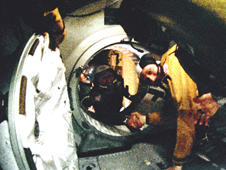
Recent press reports quote the head of the Iranian Space Agency, Mohsen Bahrami, as saying that he would like to see Iran cooperate with the American space agency, NASA. ThorGroup’s Chairman and President, Dr. John B. Sheldon, argues that while Mr. Bahrami’s sentiments are noble, political realities mean space cooperation between Tehran and Washington, DC, will not be happening anytime soon.
Occasionally, the media can take a well-meaning phrase or quote from a mid-level official and blow it all out of proportion and context. Before too long, the uttered words have gone viral and what started as an innocuous remark somehow morphs into an official position or even policy in the eyes of the public.
Such was the case earlier last week when the head of the Iran Space Agency, Mohsen Bahrami, said that, “Many in the world look at NASA’s programmes…we are interested in having cooperation, naturally. When you are in orbit, there is no country and race.”
And with these words the global press went into a frenzy, with one newspaper, the Mexico Star, running the following breathless headline: “Iran and the US: New partners in space.” No rhetorical question mark; no sense of doubt or skepticism…it’s a done deal, apparently.
If, dear reader, you are now looking for photographs of Mohsen Bahrami and NASA’s Charlie Bolden in a brotherly embrace, please do not bother. There are none, and do not anticipate such scenes anytime soon.
Mr. Bahrami’s remarks were made to commemorate the start of World Space Week, and Mr. Bahrami was one of many national space agency heads pledging greater international cooperation and their commitment to the peaceful uses of outer space.
In an important sense, Mr. Bahrami’s remarks are to be welcomed. In a time of increased geopolitical tensions between Iran on one hand, and the United States and its regional friends and partners on the other, for an Iranian official to state that cooperation in space with the United States is a desirable objective is undoubtedly a positive development. It will be a happy day indeed when Iran and the United States can cooperate in space.
But that happy day is a long, long way away, and in the meantime the unpleasant realities of geopolitics prevail. Space cooperation between Iran and the United States will only happen when Tehran and Washington, DC, resolve – or are well on their way to resolving – their deep-seated political hostilities. Until then, space cooperation between the two countries will remain a pleasant daydream.
Many will argue that this is a cynical position to take, that space cooperation between Iran and the United States will help create a much needed diplomatic space for both sides to seriously address and resolve the political hostilities that exist between them.
The usual example of space cooperation between the United States and the then Soviet Union in the 1970’s will be trotted out as an example of how space cooperation between two, otherwise mutually hostile, countries can actually create the positive conditions of peace.
If only this were actually the case.
The reality of space cooperation between countries like the United States and the Soviet Union, or in this case the U.S. and Iran, is that diplomatic dialogue and resolution of key differences creates the positive conditions for space cooperation. For many space cooperation advocates this reality is counterintuitive because their narrative is that it is space cooperation that creates the conditions for the diplomatic dialogue that can resolve underlying political differences between countries.

History, however, does not support the claim of these space cooperation advocates. When U.S. astronauts and Soviet cosmonauts shook hands in the airlocks of the rendezvoused Apollo and Soyuz capsules in Earth orbit in July 1975, the diplomatic period in the Cold War known as détente did not begin. Instead, this historic landmark in space history occurred because American and Soviet leaders and diplomats had found and exploited the opportunity to ease relations between the two superpowers. That period of the Cold War – known as détente – saw a number of opportunities and occasions between the two sides where cooperation and amity (symbolic cooperation and amity at least) were able to take place, only for it to all end when the Soviet Union invaded Afghanistan in 1979. After that, and the subsequent U.S. boycott of the Olympic Games hosted by Moscow in 1980, the United States and the Soviet Union found that the Cold War had reverted back to a deep freeze. It was only when Mikhail Gorbachev took power in the mid-1980’s that the final thaw in the Cold War occurred.
Similarly, it is only when Tehran and the United States are able to genuinely resolve their entrenched differences diplomatically that the opportunity for U.S.-Iranian space cooperation will occur. The depth of these political differences between the United States and Iran should not be underestimated, however.
Under its current regime, Iran’s conditions for a political settlement with the United States will most likely include a complete withdrawal of U.S. military forces, such as the U.S. Navy presence in Bahrain, from the Gulf and the wider Middle East. For the United States, a political settlement with Iran will have to include, at a minimum, the cessation of Iranian support for terrorist groups like Hezbollah as well as a public assurance that Israel has a right to exist and should not be subject to existential threats of annihilation.
These are fundamental principles for both sides and resolving them diplomatically is going to be very difficult and arduous. Only drastic political changes on the home front, or a radical shift in regional and global geopolitics, will allow either side to move on from those principles that in turn can create a diplomatic opening for genuine dialogue.
Ultimately, we should all like to see flourishing space cooperation between Iran and the United States. The realities of achieving this happy objective, however, should not be underestimated and will not be achieved by mere words alone.
Original published at: http://spacewatchme.com/2016/10/grow-want-astronaut-toowhy-iran-nasa-will-not-cooperating-anytime-soon/
 SpaceWatch.Global An independent perspective on space
SpaceWatch.Global An independent perspective on space

